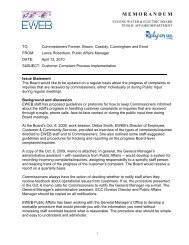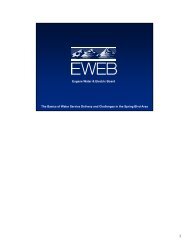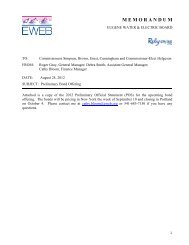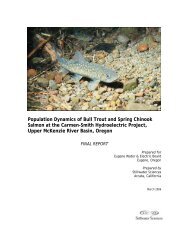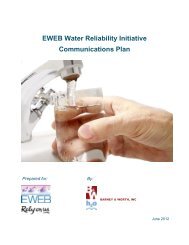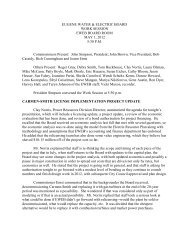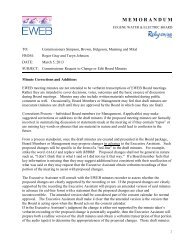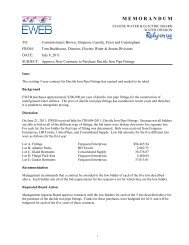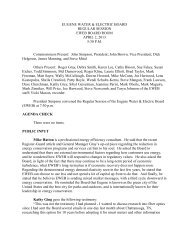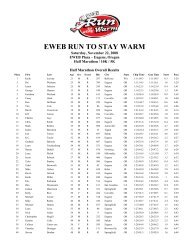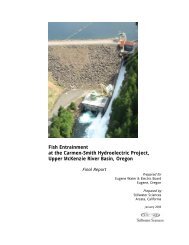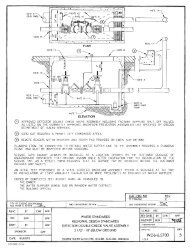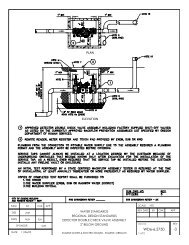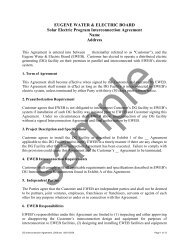Work Session Minutes - Eugene Water & Electric Board
Work Session Minutes - Eugene Water & Electric Board
Work Session Minutes - Eugene Water & Electric Board
You also want an ePaper? Increase the reach of your titles
YUMPU automatically turns print PDFs into web optimized ePapers that Google loves.
<strong>Work</strong> <strong>Session</strong><br />
October 2, 2012<br />
Page 4 of 8<br />
Commissioner Ernst said that she believes in EWEB’s Green Power program, but that she<br />
assumed it would be budgeted so that the customers who signed up would have the money to<br />
participate in it, and that now that program has been cut back and turned into sort of a lottery.<br />
She said she believes that if the <strong>Board</strong> drops the price as staff has recommended, the solar<br />
program will be gutted, and that she believes that the customers who have photovoltaic definitely<br />
need to be paid at least what they’re paying into the system for retail so that they won’t lose<br />
money.<br />
Commissioner Ernst then reiterated a previous question about what EWEB spends for<br />
power in this program. Ms. Wedin replied that annually it is static, about $300,000, and that the<br />
retail offset with the generation credit is about $80,000 per year, with 55% of residential offset at<br />
retail and 45% offset at the generation credit rate. She added that commercial net metering is at<br />
20% and 70%. Ms. Erben added that $.75 million was spent on solar in 2011.<br />
Commissioner Ernst reiterated that she feels strongly that she does not believe this is the<br />
time to pull the rug out from under the photovoltaic program, and she noted that many of those<br />
customers are also in the Green Power program. She confirmed that she will not be supporting<br />
this budget cut.<br />
Ms. Erben noted that the budget assumes no subsidies for solar because the <strong>Board</strong> had<br />
previously directed that, and that the Green Power program is funded by customer contribution<br />
so it’s outside of the budget.<br />
Ms. Erben then briefly reviewed the history of the program and showed that EWEB is<br />
actually doing more for the participating customers than they used to, and doing more for fewer<br />
customers. She noted that the incentives are the subsidy and the avoided cost is separate.<br />
Commissioner Cunningham commented that some of EWEB’s contracts have gone by<br />
the wayside, and he believes photovoltaic is not cost-effective right now. He reminded the<br />
<strong>Board</strong> that General Manager Gray inherited a mess, and that he’s not going to be a Monday<br />
morning quarterback, but that even though the <strong>Board</strong> thought it was the right thing to do at the<br />
time, they were wrong, and he wishes to move forward.<br />
President Simpson recalled that Commissioner Ernst had expressed distaste for the<br />
surplus generation payment being fed back into the system. He asked if he is correct that this is<br />
relatively rare and if he is correct in thinking that, for the most part, each site consumes more<br />
energy in total and then it never flows back.<br />
Ms. Wedin replied that in a study of 100 customers, the average annual generation credit<br />
was $114.<br />
President Simpson asked if it is true that only four out of 240 customers would be<br />
subjected to this rate, with money fed back into the system. Ms. Erben replied that at the end of<br />
the year, there will be four customers who are net generators. Ms. Wedin added that generation



